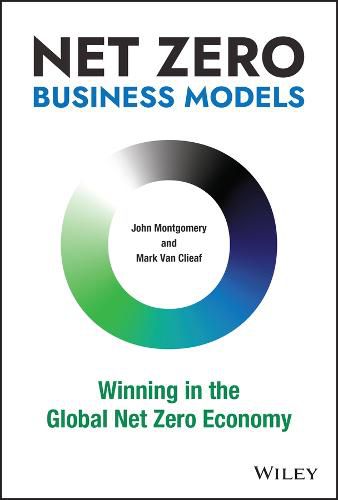Readings Newsletter
Become a Readings Member to make your shopping experience even easier.
Sign in or sign up for free!
You’re not far away from qualifying for FREE standard shipping within Australia
You’ve qualified for FREE standard shipping within Australia
The cart is loading…






Climate change is not only a carbon-centric issue but is at its core a business model design, business strategy and long horizon risk management issue. The prevailing conversation, however, has grossly underestimated the enormity of the issue and the scale of change and transformation required with both listed public companies and private companies as well. For example, in collaboration with Credit Suisse Holt ®, Mark’s consultancy, FutureZero, undetook a carbon-shock stress test to over 11,100 global securities. They found that companies with over $20 trillion of enterprise value are at material risk of suffering a significant loss of value because their current business models are not viable in the face of such a carbon shock. In other words, the prevailing conversation has greatly underestimated the systemic risk to the financial markets caused by the need to conform business models to a net zero emissions economy. As a result, most companies are unprepared for the transition, with approximately 32% having increased their greenhouse gas (GHG) emissions over the last 8 years, 25 % having had small GHG reduction and thus together in North America, 63 % of companies are not aligned with the Paris COP21/26 goals for the world. Yhe world is heading the wrong way and we need a rocket boosters to have the transformation go mainstream.
First, Net Zero Economics will fill this gap in providing new processes and tools for actually diagnosing the current business model design and distance to net zero by establishing a universal pattern language for the conversation by synthesizing key business model design terminology and providing a clear glossary of Carbon ( CO2e greenhouse gas) related metrics and new integrated measurement and reporting that are tied to carbon-adjusted performance metrics. These new carbon-adjusted performance metrics are the new true north for value creation and are not only needed to manage risks, strategically allocate capital, and leverage opportunities but also to engage and create value within investment portfolios, effectively building an accountability and fiduciary duty bridge between operating companies and their institutional investors.
Second, this first book will provide a framework for analyzing, by levels of emissions by industry sector and on an individual company basis, the actual consequences for individual businesses of conforming their business models to a net zero emissions economy. For example, a business such as Ontario Hydro (Hydro One) which produces 69 metric tons of greenhouse gases per million dollars of revenue will have a far easier time transitioning its business model to Net Zero than Duke Electric which produces 4,022 metric tons of greenhouse gases per million dollars of revenue.
$9.00 standard shipping within Australia
FREE standard shipping within Australia for orders over $100.00
Express & International shipping calculated at checkout
Climate change is not only a carbon-centric issue but is at its core a business model design, business strategy and long horizon risk management issue. The prevailing conversation, however, has grossly underestimated the enormity of the issue and the scale of change and transformation required with both listed public companies and private companies as well. For example, in collaboration with Credit Suisse Holt ®, Mark’s consultancy, FutureZero, undetook a carbon-shock stress test to over 11,100 global securities. They found that companies with over $20 trillion of enterprise value are at material risk of suffering a significant loss of value because their current business models are not viable in the face of such a carbon shock. In other words, the prevailing conversation has greatly underestimated the systemic risk to the financial markets caused by the need to conform business models to a net zero emissions economy. As a result, most companies are unprepared for the transition, with approximately 32% having increased their greenhouse gas (GHG) emissions over the last 8 years, 25 % having had small GHG reduction and thus together in North America, 63 % of companies are not aligned with the Paris COP21/26 goals for the world. Yhe world is heading the wrong way and we need a rocket boosters to have the transformation go mainstream.
First, Net Zero Economics will fill this gap in providing new processes and tools for actually diagnosing the current business model design and distance to net zero by establishing a universal pattern language for the conversation by synthesizing key business model design terminology and providing a clear glossary of Carbon ( CO2e greenhouse gas) related metrics and new integrated measurement and reporting that are tied to carbon-adjusted performance metrics. These new carbon-adjusted performance metrics are the new true north for value creation and are not only needed to manage risks, strategically allocate capital, and leverage opportunities but also to engage and create value within investment portfolios, effectively building an accountability and fiduciary duty bridge between operating companies and their institutional investors.
Second, this first book will provide a framework for analyzing, by levels of emissions by industry sector and on an individual company basis, the actual consequences for individual businesses of conforming their business models to a net zero emissions economy. For example, a business such as Ontario Hydro (Hydro One) which produces 69 metric tons of greenhouse gases per million dollars of revenue will have a far easier time transitioning its business model to Net Zero than Duke Electric which produces 4,022 metric tons of greenhouse gases per million dollars of revenue.